The Dynamics of Crude Oil Prices in the UK: 2010-2020 Analysis
VerifiedAdded on 2023/01/09
|12
|3814
|36
Report
AI Summary
This report provides a comprehensive analysis of the UK crude oil market from 2010 to 2020, examining the fluctuations in oil prices and the underlying economic determinants. It explores the impact of various factors, including changes in global supply and demand, government policies, and events such as Brexit and the COVID-19 pandemic. The report delves into the economic determinants of oil price changes, discussing the influence of the balance of payments, local economic conditions, technological advancements, and GDP impact. It also highlights the role of OPEC and the effects of supply and demand dynamics. Furthermore, the report assesses the impact of government actions during the period and considers the present and future effects of COVID-19 on crude oil prices, offering a detailed overview of the UK oil market's evolution and the forces that shape it. This report, available on Desklib, provides valuable insights for students studying economics and related fields.

Global business
environment
environment
Paraphrase This Document
Need a fresh take? Get an instant paraphrase of this document with our AI Paraphraser
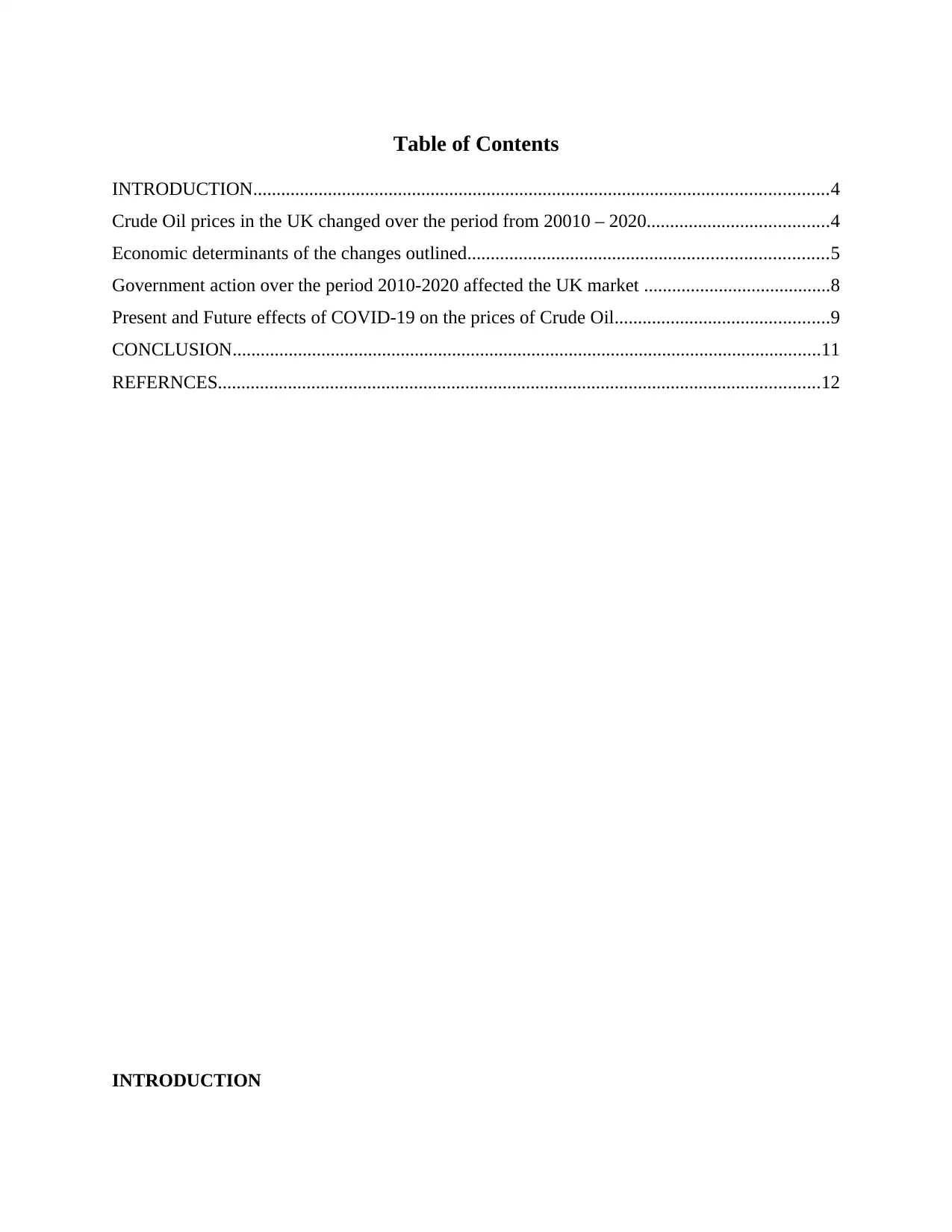
Table of Contents
INTRODUCTION...........................................................................................................................4
Crude Oil prices in the UK changed over the period from 20010 – 2020.......................................4
Economic determinants of the changes outlined.............................................................................5
Government action over the period 2010-2020 affected the UK market ........................................8
Present and Future effects of COVID-19 on the prices of Crude Oil..............................................9
CONCLUSION..............................................................................................................................11
REFERNCES.................................................................................................................................12
INTRODUCTION
INTRODUCTION...........................................................................................................................4
Crude Oil prices in the UK changed over the period from 20010 – 2020.......................................4
Economic determinants of the changes outlined.............................................................................5
Government action over the period 2010-2020 affected the UK market ........................................8
Present and Future effects of COVID-19 on the prices of Crude Oil..............................................9
CONCLUSION..............................................................................................................................11
REFERNCES.................................................................................................................................12
INTRODUCTION
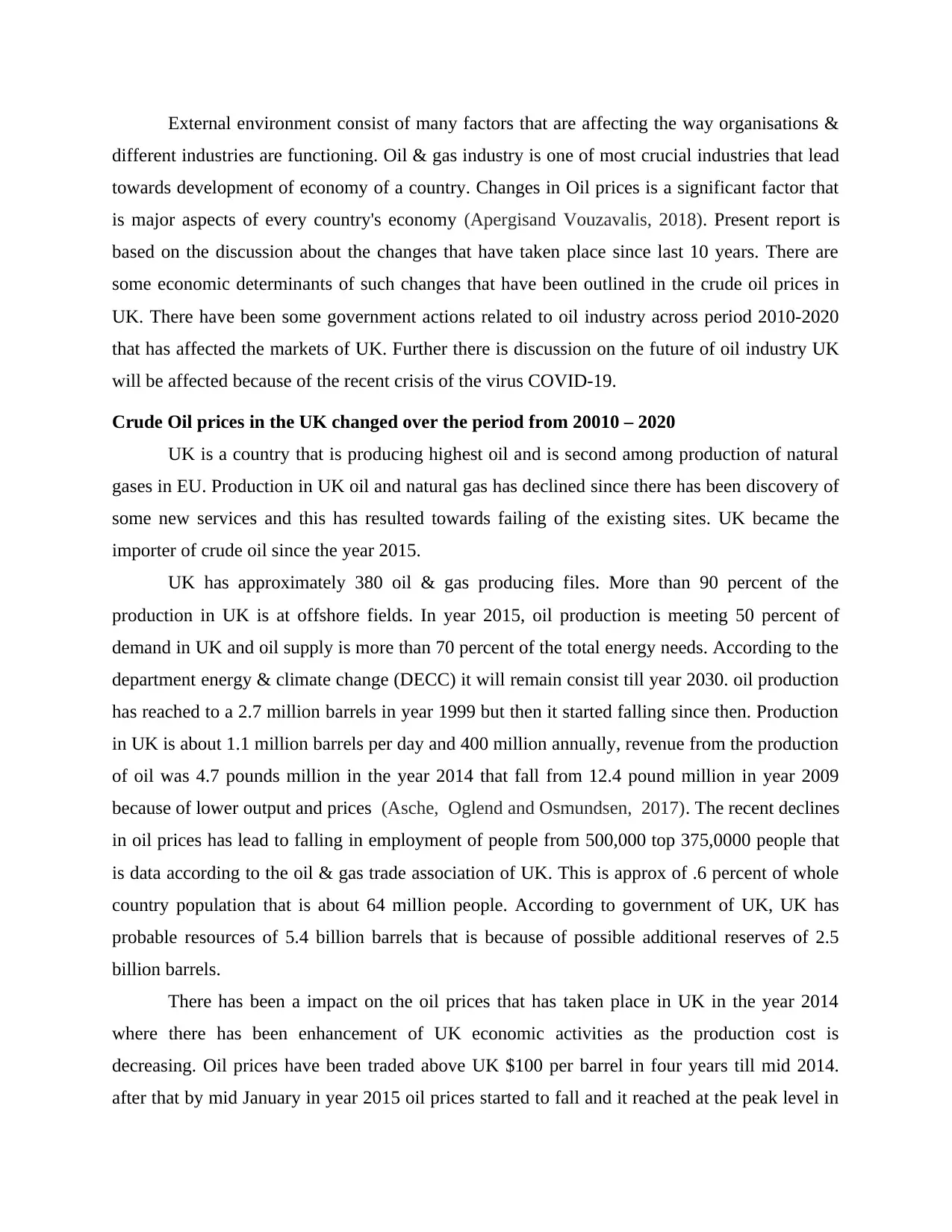
External environment consist of many factors that are affecting the way organisations &
different industries are functioning. Oil & gas industry is one of most crucial industries that lead
towards development of economy of a country. Changes in Oil prices is a significant factor that
is major aspects of every country's economy (Apergisand Vouzavalis, 2018). Present report is
based on the discussion about the changes that have taken place since last 10 years. There are
some economic determinants of such changes that have been outlined in the crude oil prices in
UK. There have been some government actions related to oil industry across period 2010-2020
that has affected the markets of UK. Further there is discussion on the future of oil industry UK
will be affected because of the recent crisis of the virus COVID-19.
Crude Oil prices in the UK changed over the period from 20010 – 2020
UK is a country that is producing highest oil and is second among production of natural
gases in EU. Production in UK oil and natural gas has declined since there has been discovery of
some new services and this has resulted towards failing of the existing sites. UK became the
importer of crude oil since the year 2015.
UK has approximately 380 oil & gas producing files. More than 90 percent of the
production in UK is at offshore fields. In year 2015, oil production is meeting 50 percent of
demand in UK and oil supply is more than 70 percent of the total energy needs. According to the
department energy & climate change (DECC) it will remain consist till year 2030. oil production
has reached to a 2.7 million barrels in year 1999 but then it started falling since then. Production
in UK is about 1.1 million barrels per day and 400 million annually, revenue from the production
of oil was 4.7 pounds million in the year 2014 that fall from 12.4 pound million in year 2009
because of lower output and prices (Asche, Oglend and Osmundsen, 2017). The recent declines
in oil prices has lead to falling in employment of people from 500,000 top 375,0000 people that
is data according to the oil & gas trade association of UK. This is approx of .6 percent of whole
country population that is about 64 million people. According to government of UK, UK has
probable resources of 5.4 billion barrels that is because of possible additional reserves of 2.5
billion barrels.
There has been a impact on the oil prices that has taken place in UK in the year 2014
where there has been enhancement of UK economic activities as the production cost is
decreasing. Oil prices have been traded above UK $100 per barrel in four years till mid 2014.
after that by mid January in year 2015 oil prices started to fall and it reached at the peak level in
different industries are functioning. Oil & gas industry is one of most crucial industries that lead
towards development of economy of a country. Changes in Oil prices is a significant factor that
is major aspects of every country's economy (Apergisand Vouzavalis, 2018). Present report is
based on the discussion about the changes that have taken place since last 10 years. There are
some economic determinants of such changes that have been outlined in the crude oil prices in
UK. There have been some government actions related to oil industry across period 2010-2020
that has affected the markets of UK. Further there is discussion on the future of oil industry UK
will be affected because of the recent crisis of the virus COVID-19.
Crude Oil prices in the UK changed over the period from 20010 – 2020
UK is a country that is producing highest oil and is second among production of natural
gases in EU. Production in UK oil and natural gas has declined since there has been discovery of
some new services and this has resulted towards failing of the existing sites. UK became the
importer of crude oil since the year 2015.
UK has approximately 380 oil & gas producing files. More than 90 percent of the
production in UK is at offshore fields. In year 2015, oil production is meeting 50 percent of
demand in UK and oil supply is more than 70 percent of the total energy needs. According to the
department energy & climate change (DECC) it will remain consist till year 2030. oil production
has reached to a 2.7 million barrels in year 1999 but then it started falling since then. Production
in UK is about 1.1 million barrels per day and 400 million annually, revenue from the production
of oil was 4.7 pounds million in the year 2014 that fall from 12.4 pound million in year 2009
because of lower output and prices (Asche, Oglend and Osmundsen, 2017). The recent declines
in oil prices has lead to falling in employment of people from 500,000 top 375,0000 people that
is data according to the oil & gas trade association of UK. This is approx of .6 percent of whole
country population that is about 64 million people. According to government of UK, UK has
probable resources of 5.4 billion barrels that is because of possible additional reserves of 2.5
billion barrels.
There has been a impact on the oil prices that has taken place in UK in the year 2014
where there has been enhancement of UK economic activities as the production cost is
decreasing. Oil prices have been traded above UK $100 per barrel in four years till mid 2014.
after that by mid January in year 2015 oil prices started to fall and it reached at the peak level in
⊘ This is a preview!⊘
Do you want full access?
Subscribe today to unlock all pages.

Trusted by 1+ million students worldwide
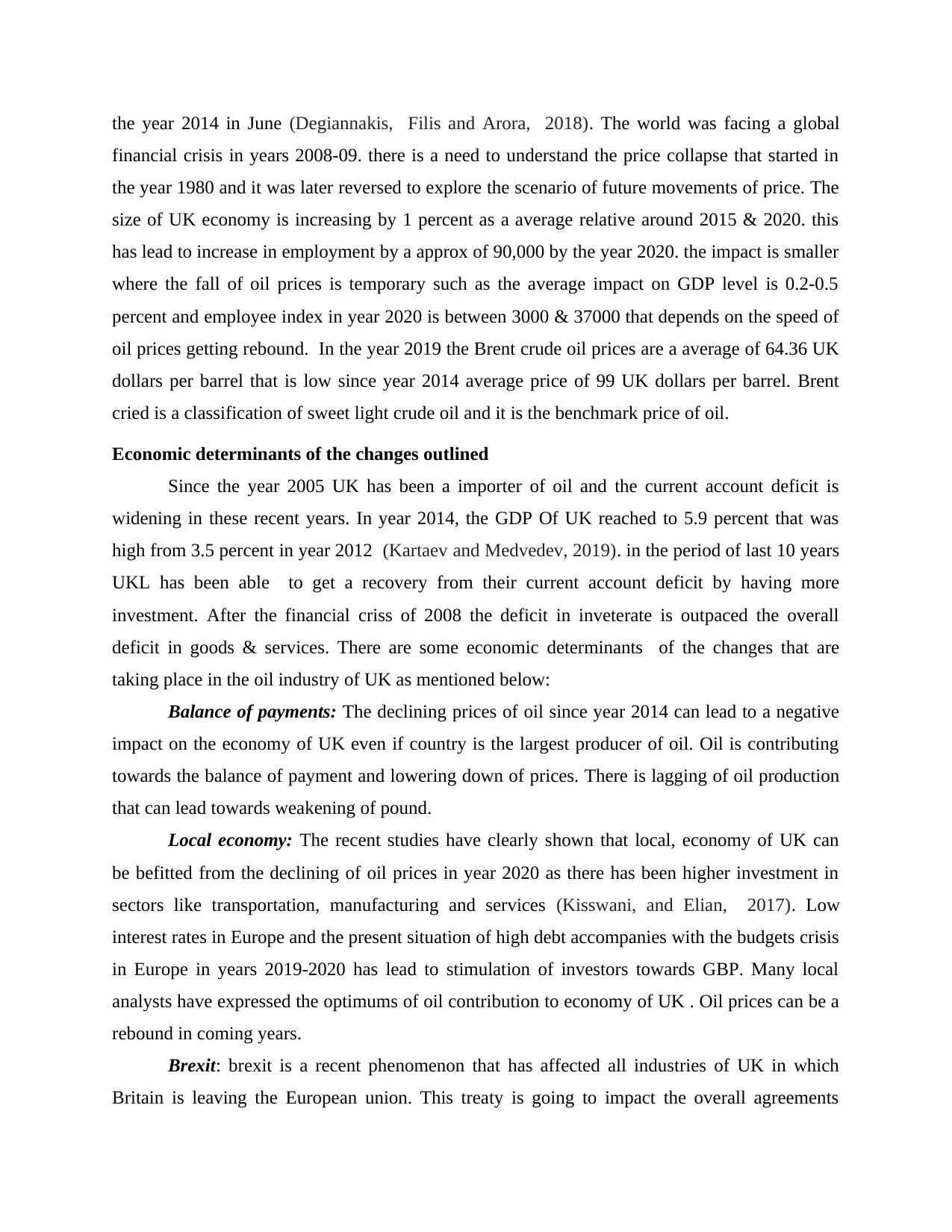
the year 2014 in June (Degiannakis, Filis and Arora, 2018). The world was facing a global
financial crisis in years 2008-09. there is a need to understand the price collapse that started in
the year 1980 and it was later reversed to explore the scenario of future movements of price. The
size of UK economy is increasing by 1 percent as a average relative around 2015 & 2020. this
has lead to increase in employment by a approx of 90,000 by the year 2020. the impact is smaller
where the fall of oil prices is temporary such as the average impact on GDP level is 0.2-0.5
percent and employee index in year 2020 is between 3000 & 37000 that depends on the speed of
oil prices getting rebound. In the year 2019 the Brent crude oil prices are a average of 64.36 UK
dollars per barrel that is low since year 2014 average price of 99 UK dollars per barrel. Brent
cried is a classification of sweet light crude oil and it is the benchmark price of oil.
Economic determinants of the changes outlined
Since the year 2005 UK has been a importer of oil and the current account deficit is
widening in these recent years. In year 2014, the GDP Of UK reached to 5.9 percent that was
high from 3.5 percent in year 2012 (Kartaev and Medvedev, 2019). in the period of last 10 years
UKL has been able to get a recovery from their current account deficit by having more
investment. After the financial criss of 2008 the deficit in inveterate is outpaced the overall
deficit in goods & services. There are some economic determinants of the changes that are
taking place in the oil industry of UK as mentioned below:
Balance of payments: The declining prices of oil since year 2014 can lead to a negative
impact on the economy of UK even if country is the largest producer of oil. Oil is contributing
towards the balance of payment and lowering down of prices. There is lagging of oil production
that can lead towards weakening of pound.
Local economy: The recent studies have clearly shown that local, economy of UK can
be befitted from the declining of oil prices in year 2020 as there has been higher investment in
sectors like transportation, manufacturing and services (Kisswani, and Elian, 2017). Low
interest rates in Europe and the present situation of high debt accompanies with the budgets crisis
in Europe in years 2019-2020 has lead to stimulation of investors towards GBP. Many local
analysts have expressed the optimums of oil contribution to economy of UK . Oil prices can be a
rebound in coming years.
Brexit: brexit is a recent phenomenon that has affected all industries of UK in which
Britain is leaving the European union. This treaty is going to impact the overall agreements
financial crisis in years 2008-09. there is a need to understand the price collapse that started in
the year 1980 and it was later reversed to explore the scenario of future movements of price. The
size of UK economy is increasing by 1 percent as a average relative around 2015 & 2020. this
has lead to increase in employment by a approx of 90,000 by the year 2020. the impact is smaller
where the fall of oil prices is temporary such as the average impact on GDP level is 0.2-0.5
percent and employee index in year 2020 is between 3000 & 37000 that depends on the speed of
oil prices getting rebound. In the year 2019 the Brent crude oil prices are a average of 64.36 UK
dollars per barrel that is low since year 2014 average price of 99 UK dollars per barrel. Brent
cried is a classification of sweet light crude oil and it is the benchmark price of oil.
Economic determinants of the changes outlined
Since the year 2005 UK has been a importer of oil and the current account deficit is
widening in these recent years. In year 2014, the GDP Of UK reached to 5.9 percent that was
high from 3.5 percent in year 2012 (Kartaev and Medvedev, 2019). in the period of last 10 years
UKL has been able to get a recovery from their current account deficit by having more
investment. After the financial criss of 2008 the deficit in inveterate is outpaced the overall
deficit in goods & services. There are some economic determinants of the changes that are
taking place in the oil industry of UK as mentioned below:
Balance of payments: The declining prices of oil since year 2014 can lead to a negative
impact on the economy of UK even if country is the largest producer of oil. Oil is contributing
towards the balance of payment and lowering down of prices. There is lagging of oil production
that can lead towards weakening of pound.
Local economy: The recent studies have clearly shown that local, economy of UK can
be befitted from the declining of oil prices in year 2020 as there has been higher investment in
sectors like transportation, manufacturing and services (Kisswani, and Elian, 2017). Low
interest rates in Europe and the present situation of high debt accompanies with the budgets crisis
in Europe in years 2019-2020 has lead to stimulation of investors towards GBP. Many local
analysts have expressed the optimums of oil contribution to economy of UK . Oil prices can be a
rebound in coming years.
Brexit: brexit is a recent phenomenon that has affected all industries of UK in which
Britain is leaving the European union. This treaty is going to impact the overall agreements
Paraphrase This Document
Need a fresh take? Get an instant paraphrase of this document with our AI Paraphraser
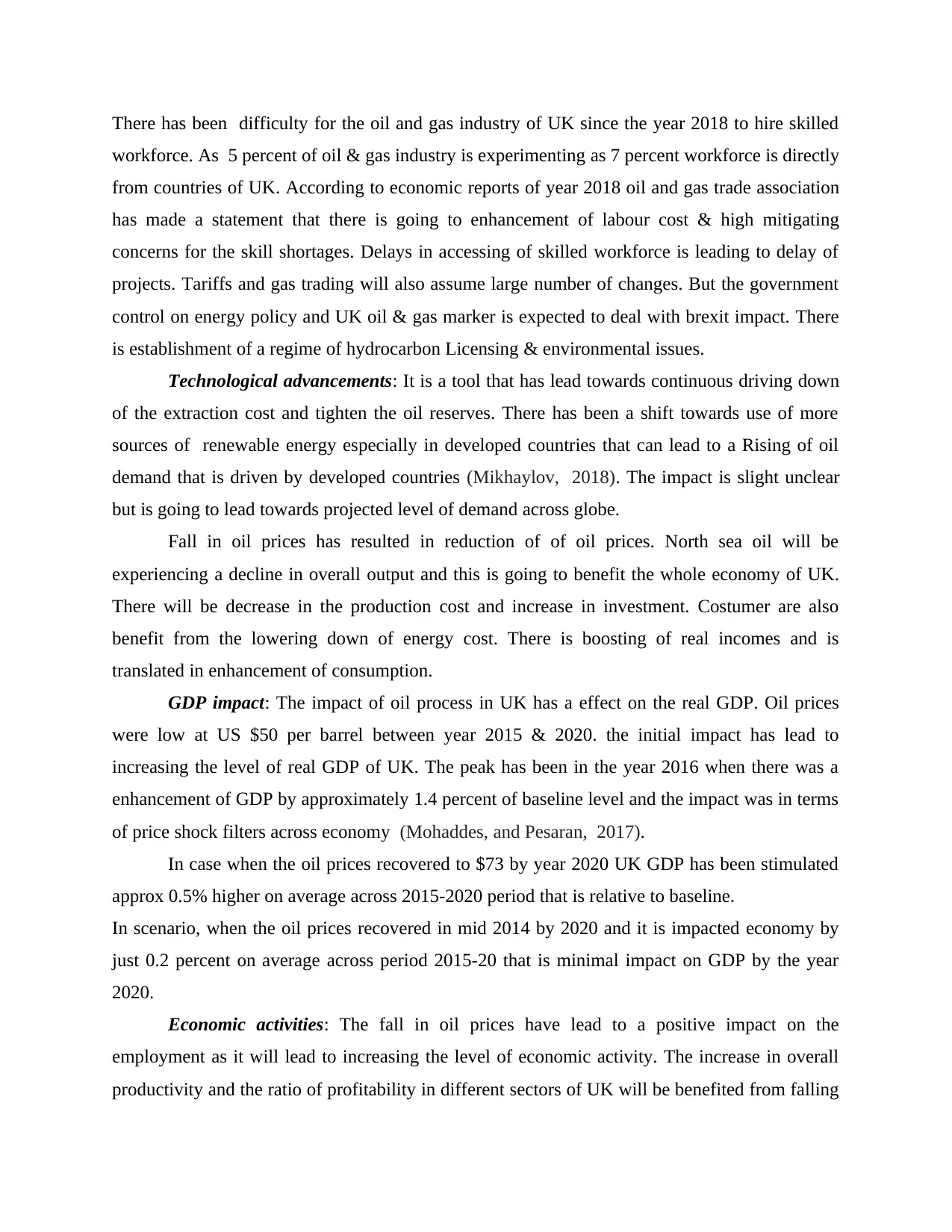
There has been difficulty for the oil and gas industry of UK since the year 2018 to hire skilled
workforce. As 5 percent of oil & gas industry is experimenting as 7 percent workforce is directly
from countries of UK. According to economic reports of year 2018 oil and gas trade association
has made a statement that there is going to enhancement of labour cost & high mitigating
concerns for the skill shortages. Delays in accessing of skilled workforce is leading to delay of
projects. Tariffs and gas trading will also assume large number of changes. But the government
control on energy policy and UK oil & gas marker is expected to deal with brexit impact. There
is establishment of a regime of hydrocarbon Licensing & environmental issues.
Technological advancements: It is a tool that has lead towards continuous driving down
of the extraction cost and tighten the oil reserves. There has been a shift towards use of more
sources of renewable energy especially in developed countries that can lead to a Rising of oil
demand that is driven by developed countries (Mikhaylov, 2018). The impact is slight unclear
but is going to lead towards projected level of demand across globe.
Fall in oil prices has resulted in reduction of of oil prices. North sea oil will be
experiencing a decline in overall output and this is going to benefit the whole economy of UK.
There will be decrease in the production cost and increase in investment. Costumer are also
benefit from the lowering down of energy cost. There is boosting of real incomes and is
translated in enhancement of consumption.
GDP impact: The impact of oil process in UK has a effect on the real GDP. Oil prices
were low at US $50 per barrel between year 2015 & 2020. the initial impact has lead to
increasing the level of real GDP of UK. The peak has been in the year 2016 when there was a
enhancement of GDP by approximately 1.4 percent of baseline level and the impact was in terms
of price shock filters across economy (Mohaddes, and Pesaran, 2017).
In case when the oil prices recovered to $73 by year 2020 UK GDP has been stimulated
approx 0.5% higher on average across 2015-2020 period that is relative to baseline.
In scenario, when the oil prices recovered in mid 2014 by 2020 and it is impacted economy by
just 0.2 percent on average across period 2015-20 that is minimal impact on GDP by the year
2020.
Economic activities: The fall in oil prices have lead to a positive impact on the
employment as it will lead to increasing the level of economic activity. The increase in overall
productivity and the ratio of profitability in different sectors of UK will be benefited from falling
workforce. As 5 percent of oil & gas industry is experimenting as 7 percent workforce is directly
from countries of UK. According to economic reports of year 2018 oil and gas trade association
has made a statement that there is going to enhancement of labour cost & high mitigating
concerns for the skill shortages. Delays in accessing of skilled workforce is leading to delay of
projects. Tariffs and gas trading will also assume large number of changes. But the government
control on energy policy and UK oil & gas marker is expected to deal with brexit impact. There
is establishment of a regime of hydrocarbon Licensing & environmental issues.
Technological advancements: It is a tool that has lead towards continuous driving down
of the extraction cost and tighten the oil reserves. There has been a shift towards use of more
sources of renewable energy especially in developed countries that can lead to a Rising of oil
demand that is driven by developed countries (Mikhaylov, 2018). The impact is slight unclear
but is going to lead towards projected level of demand across globe.
Fall in oil prices has resulted in reduction of of oil prices. North sea oil will be
experiencing a decline in overall output and this is going to benefit the whole economy of UK.
There will be decrease in the production cost and increase in investment. Costumer are also
benefit from the lowering down of energy cost. There is boosting of real incomes and is
translated in enhancement of consumption.
GDP impact: The impact of oil process in UK has a effect on the real GDP. Oil prices
were low at US $50 per barrel between year 2015 & 2020. the initial impact has lead to
increasing the level of real GDP of UK. The peak has been in the year 2016 when there was a
enhancement of GDP by approximately 1.4 percent of baseline level and the impact was in terms
of price shock filters across economy (Mohaddes, and Pesaran, 2017).
In case when the oil prices recovered to $73 by year 2020 UK GDP has been stimulated
approx 0.5% higher on average across 2015-2020 period that is relative to baseline.
In scenario, when the oil prices recovered in mid 2014 by 2020 and it is impacted economy by
just 0.2 percent on average across period 2015-20 that is minimal impact on GDP by the year
2020.
Economic activities: The fall in oil prices have lead to a positive impact on the
employment as it will lead to increasing the level of economic activity. The increase in overall
productivity and the ratio of profitability in different sectors of UK will be benefited from falling
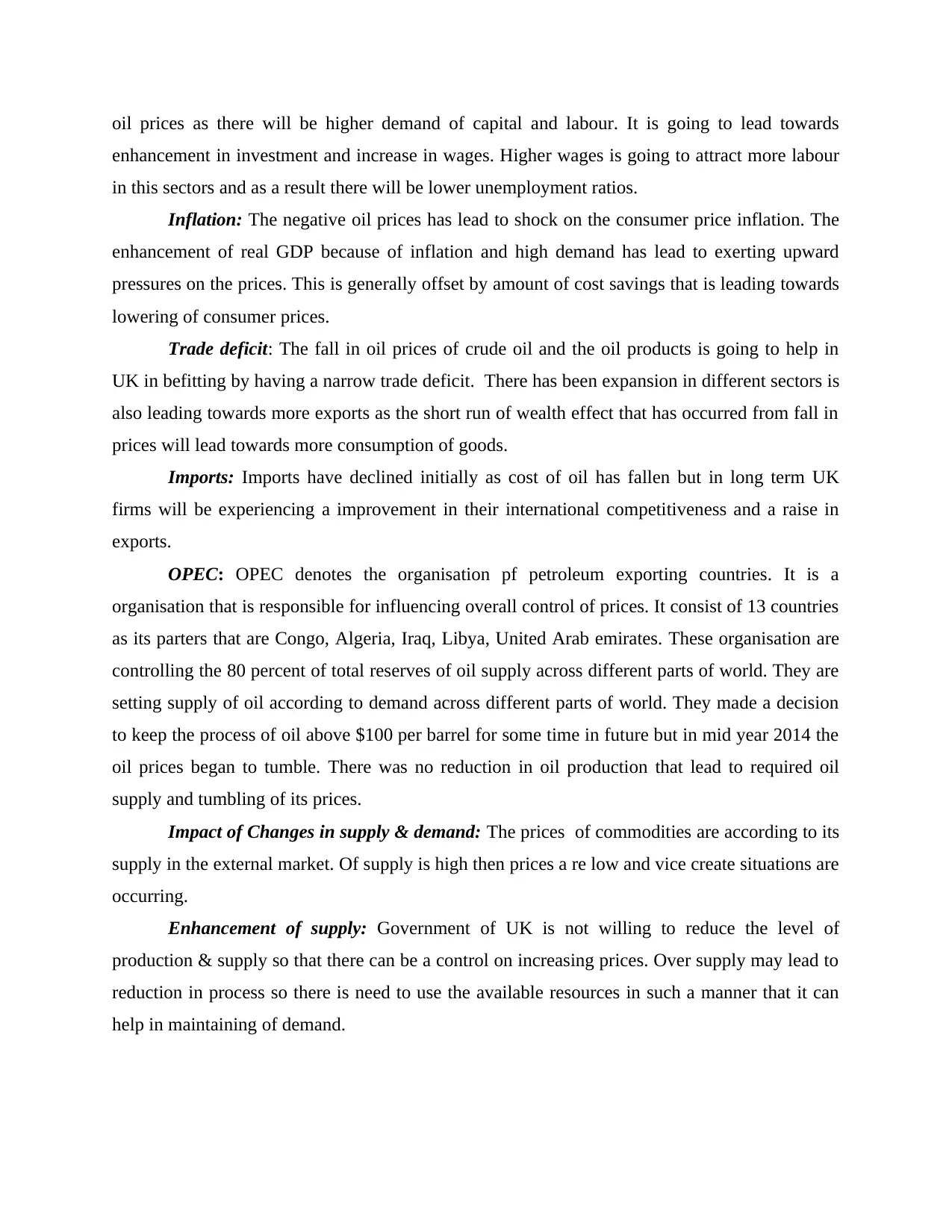
oil prices as there will be higher demand of capital and labour. It is going to lead towards
enhancement in investment and increase in wages. Higher wages is going to attract more labour
in this sectors and as a result there will be lower unemployment ratios.
Inflation: The negative oil prices has lead to shock on the consumer price inflation. The
enhancement of real GDP because of inflation and high demand has lead to exerting upward
pressures on the prices. This is generally offset by amount of cost savings that is leading towards
lowering of consumer prices.
Trade deficit: The fall in oil prices of crude oil and the oil products is going to help in
UK in befitting by having a narrow trade deficit. There has been expansion in different sectors is
also leading towards more exports as the short run of wealth effect that has occurred from fall in
prices will lead towards more consumption of goods.
Imports: Imports have declined initially as cost of oil has fallen but in long term UK
firms will be experiencing a improvement in their international competitiveness and a raise in
exports.
OPEC: OPEC denotes the organisation pf petroleum exporting countries. It is a
organisation that is responsible for influencing overall control of prices. It consist of 13 countries
as its parters that are Congo, Algeria, Iraq, Libya, United Arab emirates. These organisation are
controlling the 80 percent of total reserves of oil supply across different parts of world. They are
setting supply of oil according to demand across different parts of world. They made a decision
to keep the process of oil above $100 per barrel for some time in future but in mid year 2014 the
oil prices began to tumble. There was no reduction in oil production that lead to required oil
supply and tumbling of its prices.
Impact of Changes in supply & demand: The prices of commodities are according to its
supply in the external market. Of supply is high then prices a re low and vice create situations are
occurring.
Enhancement of supply: Government of UK is not willing to reduce the level of
production & supply so that there can be a control on increasing prices. Over supply may lead to
reduction in process so there is need to use the available resources in such a manner that it can
help in maintaining of demand.
enhancement in investment and increase in wages. Higher wages is going to attract more labour
in this sectors and as a result there will be lower unemployment ratios.
Inflation: The negative oil prices has lead to shock on the consumer price inflation. The
enhancement of real GDP because of inflation and high demand has lead to exerting upward
pressures on the prices. This is generally offset by amount of cost savings that is leading towards
lowering of consumer prices.
Trade deficit: The fall in oil prices of crude oil and the oil products is going to help in
UK in befitting by having a narrow trade deficit. There has been expansion in different sectors is
also leading towards more exports as the short run of wealth effect that has occurred from fall in
prices will lead towards more consumption of goods.
Imports: Imports have declined initially as cost of oil has fallen but in long term UK
firms will be experiencing a improvement in their international competitiveness and a raise in
exports.
OPEC: OPEC denotes the organisation pf petroleum exporting countries. It is a
organisation that is responsible for influencing overall control of prices. It consist of 13 countries
as its parters that are Congo, Algeria, Iraq, Libya, United Arab emirates. These organisation are
controlling the 80 percent of total reserves of oil supply across different parts of world. They are
setting supply of oil according to demand across different parts of world. They made a decision
to keep the process of oil above $100 per barrel for some time in future but in mid year 2014 the
oil prices began to tumble. There was no reduction in oil production that lead to required oil
supply and tumbling of its prices.
Impact of Changes in supply & demand: The prices of commodities are according to its
supply in the external market. Of supply is high then prices a re low and vice create situations are
occurring.
Enhancement of supply: Government of UK is not willing to reduce the level of
production & supply so that there can be a control on increasing prices. Over supply may lead to
reduction in process so there is need to use the available resources in such a manner that it can
help in maintaining of demand.
⊘ This is a preview!⊘
Do you want full access?
Subscribe today to unlock all pages.

Trusted by 1+ million students worldwide
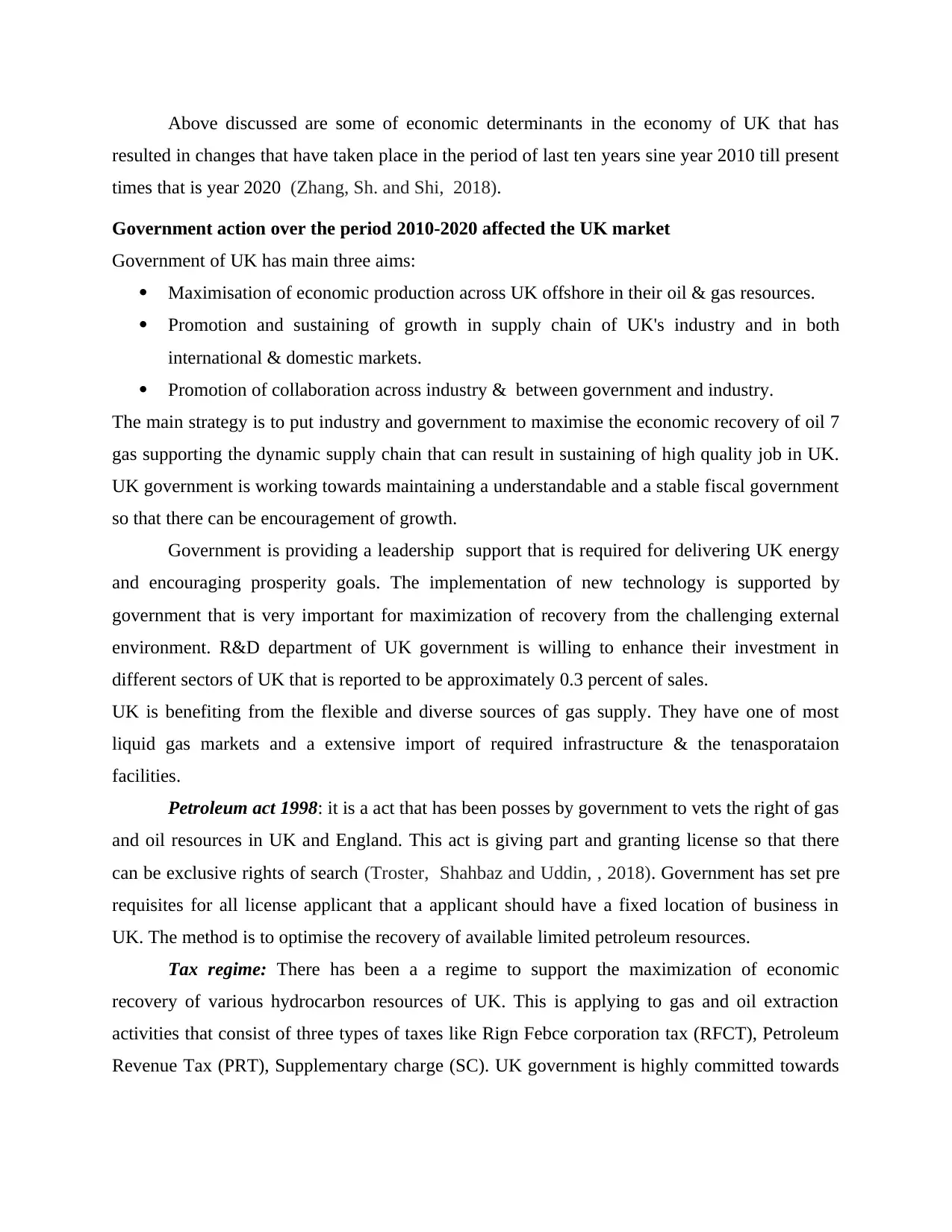
Above discussed are some of economic determinants in the economy of UK that has
resulted in changes that have taken place in the period of last ten years sine year 2010 till present
times that is year 2020 (Zhang, Sh. and Shi, 2018).
Government action over the period 2010-2020 affected the UK market
Government of UK has main three aims:
Maximisation of economic production across UK offshore in their oil & gas resources.
Promotion and sustaining of growth in supply chain of UK's industry and in both
international & domestic markets.
Promotion of collaboration across industry & between government and industry.
The main strategy is to put industry and government to maximise the economic recovery of oil 7
gas supporting the dynamic supply chain that can result in sustaining of high quality job in UK.
UK government is working towards maintaining a understandable and a stable fiscal government
so that there can be encouragement of growth.
Government is providing a leadership support that is required for delivering UK energy
and encouraging prosperity goals. The implementation of new technology is supported by
government that is very important for maximization of recovery from the challenging external
environment. R&D department of UK government is willing to enhance their investment in
different sectors of UK that is reported to be approximately 0.3 percent of sales.
UK is benefiting from the flexible and diverse sources of gas supply. They have one of most
liquid gas markets and a extensive import of required infrastructure & the tenasporataion
facilities.
Petroleum act 1998: it is a act that has been posses by government to vets the right of gas
and oil resources in UK and England. This act is giving part and granting license so that there
can be exclusive rights of search (Troster, Shahbaz and Uddin, , 2018). Government has set pre
requisites for all license applicant that a applicant should have a fixed location of business in
UK. The method is to optimise the recovery of available limited petroleum resources.
Tax regime: There has been a a regime to support the maximization of economic
recovery of various hydrocarbon resources of UK. This is applying to gas and oil extraction
activities that consist of three types of taxes like Rign Febce corporation tax (RFCT), Petroleum
Revenue Tax (PRT), Supplementary charge (SC). UK government is highly committed towards
resulted in changes that have taken place in the period of last ten years sine year 2010 till present
times that is year 2020 (Zhang, Sh. and Shi, 2018).
Government action over the period 2010-2020 affected the UK market
Government of UK has main three aims:
Maximisation of economic production across UK offshore in their oil & gas resources.
Promotion and sustaining of growth in supply chain of UK's industry and in both
international & domestic markets.
Promotion of collaboration across industry & between government and industry.
The main strategy is to put industry and government to maximise the economic recovery of oil 7
gas supporting the dynamic supply chain that can result in sustaining of high quality job in UK.
UK government is working towards maintaining a understandable and a stable fiscal government
so that there can be encouragement of growth.
Government is providing a leadership support that is required for delivering UK energy
and encouraging prosperity goals. The implementation of new technology is supported by
government that is very important for maximization of recovery from the challenging external
environment. R&D department of UK government is willing to enhance their investment in
different sectors of UK that is reported to be approximately 0.3 percent of sales.
UK is benefiting from the flexible and diverse sources of gas supply. They have one of most
liquid gas markets and a extensive import of required infrastructure & the tenasporataion
facilities.
Petroleum act 1998: it is a act that has been posses by government to vets the right of gas
and oil resources in UK and England. This act is giving part and granting license so that there
can be exclusive rights of search (Troster, Shahbaz and Uddin, , 2018). Government has set pre
requisites for all license applicant that a applicant should have a fixed location of business in
UK. The method is to optimise the recovery of available limited petroleum resources.
Tax regime: There has been a a regime to support the maximization of economic
recovery of various hydrocarbon resources of UK. This is applying to gas and oil extraction
activities that consist of three types of taxes like Rign Febce corporation tax (RFCT), Petroleum
Revenue Tax (PRT), Supplementary charge (SC). UK government is highly committed towards
Paraphrase This Document
Need a fresh take? Get an instant paraphrase of this document with our AI Paraphraser
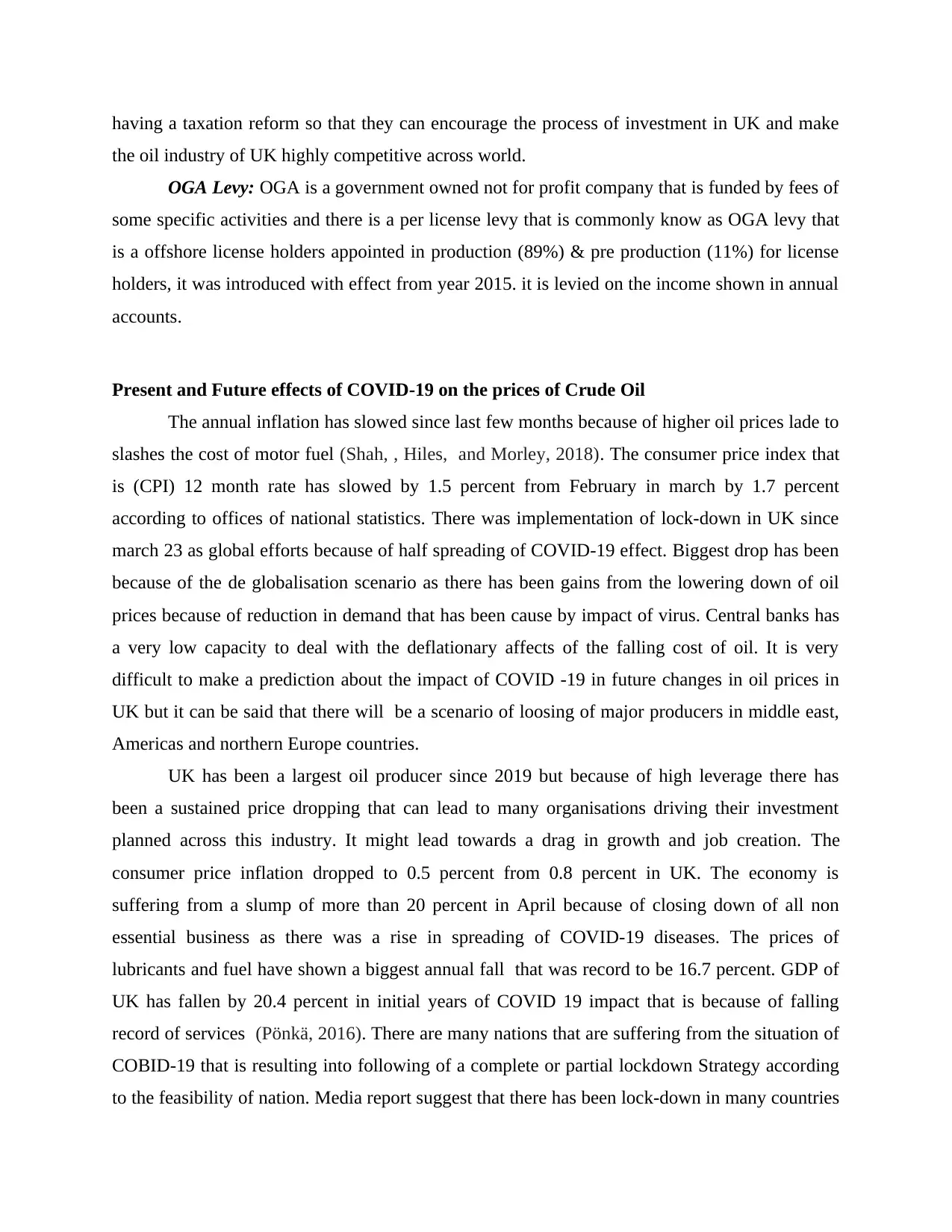
having a taxation reform so that they can encourage the process of investment in UK and make
the oil industry of UK highly competitive across world.
OGA Levy: OGA is a government owned not for profit company that is funded by fees of
some specific activities and there is a per license levy that is commonly know as OGA levy that
is a offshore license holders appointed in production (89%) & pre production (11%) for license
holders, it was introduced with effect from year 2015. it is levied on the income shown in annual
accounts.
Present and Future effects of COVID-19 on the prices of Crude Oil
The annual inflation has slowed since last few months because of higher oil prices lade to
slashes the cost of motor fuel (Shah, , Hiles, and Morley, 2018). The consumer price index that
is (CPI) 12 month rate has slowed by 1.5 percent from February in march by 1.7 percent
according to offices of national statistics. There was implementation of lock-down in UK since
march 23 as global efforts because of half spreading of COVID-19 effect. Biggest drop has been
because of the de globalisation scenario as there has been gains from the lowering down of oil
prices because of reduction in demand that has been cause by impact of virus. Central banks has
a very low capacity to deal with the deflationary affects of the falling cost of oil. It is very
difficult to make a prediction about the impact of COVID -19 in future changes in oil prices in
UK but it can be said that there will be a scenario of loosing of major producers in middle east,
Americas and northern Europe countries.
UK has been a largest oil producer since 2019 but because of high leverage there has
been a sustained price dropping that can lead to many organisations driving their investment
planned across this industry. It might lead towards a drag in growth and job creation. The
consumer price inflation dropped to 0.5 percent from 0.8 percent in UK. The economy is
suffering from a slump of more than 20 percent in April because of closing down of all non
essential business as there was a rise in spreading of COVID-19 diseases. The prices of
lubricants and fuel have shown a biggest annual fall that was record to be 16.7 percent. GDP of
UK has fallen by 20.4 percent in initial years of COVID 19 impact that is because of falling
record of services (Pönkä, 2016). There are many nations that are suffering from the situation of
COBID-19 that is resulting into following of a complete or partial lockdown Strategy according
to the feasibility of nation. Media report suggest that there has been lock-down in many countries
the oil industry of UK highly competitive across world.
OGA Levy: OGA is a government owned not for profit company that is funded by fees of
some specific activities and there is a per license levy that is commonly know as OGA levy that
is a offshore license holders appointed in production (89%) & pre production (11%) for license
holders, it was introduced with effect from year 2015. it is levied on the income shown in annual
accounts.
Present and Future effects of COVID-19 on the prices of Crude Oil
The annual inflation has slowed since last few months because of higher oil prices lade to
slashes the cost of motor fuel (Shah, , Hiles, and Morley, 2018). The consumer price index that
is (CPI) 12 month rate has slowed by 1.5 percent from February in march by 1.7 percent
according to offices of national statistics. There was implementation of lock-down in UK since
march 23 as global efforts because of half spreading of COVID-19 effect. Biggest drop has been
because of the de globalisation scenario as there has been gains from the lowering down of oil
prices because of reduction in demand that has been cause by impact of virus. Central banks has
a very low capacity to deal with the deflationary affects of the falling cost of oil. It is very
difficult to make a prediction about the impact of COVID -19 in future changes in oil prices in
UK but it can be said that there will be a scenario of loosing of major producers in middle east,
Americas and northern Europe countries.
UK has been a largest oil producer since 2019 but because of high leverage there has
been a sustained price dropping that can lead to many organisations driving their investment
planned across this industry. It might lead towards a drag in growth and job creation. The
consumer price inflation dropped to 0.5 percent from 0.8 percent in UK. The economy is
suffering from a slump of more than 20 percent in April because of closing down of all non
essential business as there was a rise in spreading of COVID-19 diseases. The prices of
lubricants and fuel have shown a biggest annual fall that was record to be 16.7 percent. GDP of
UK has fallen by 20.4 percent in initial years of COVID 19 impact that is because of falling
record of services (Pönkä, 2016). There are many nations that are suffering from the situation of
COBID-19 that is resulting into following of a complete or partial lockdown Strategy according
to the feasibility of nation. Media report suggest that there has been lock-down in many countries
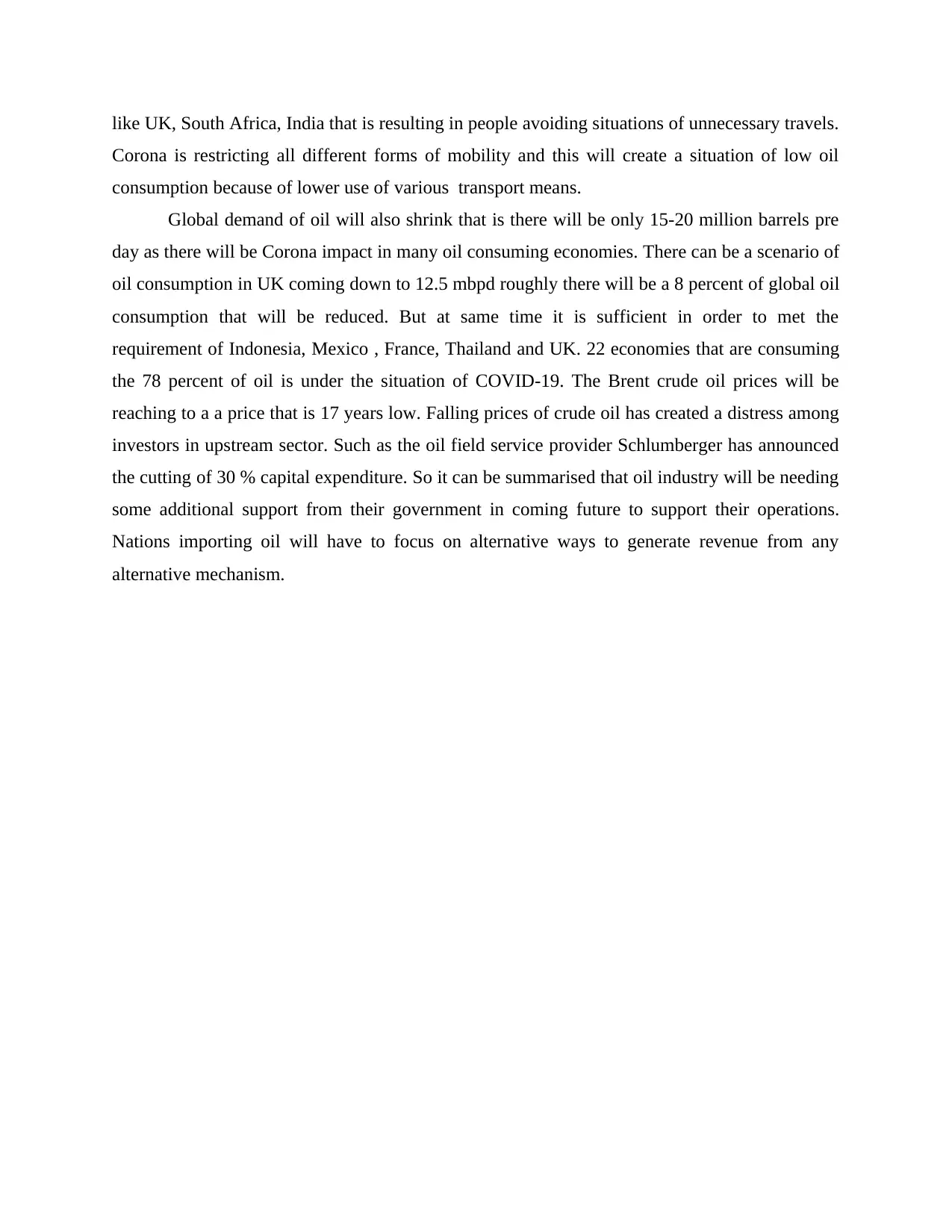
like UK, South Africa, India that is resulting in people avoiding situations of unnecessary travels.
Corona is restricting all different forms of mobility and this will create a situation of low oil
consumption because of lower use of various transport means.
Global demand of oil will also shrink that is there will be only 15-20 million barrels pre
day as there will be Corona impact in many oil consuming economies. There can be a scenario of
oil consumption in UK coming down to 12.5 mbpd roughly there will be a 8 percent of global oil
consumption that will be reduced. But at same time it is sufficient in order to met the
requirement of Indonesia, Mexico , France, Thailand and UK. 22 economies that are consuming
the 78 percent of oil is under the situation of COVID-19. The Brent crude oil prices will be
reaching to a a price that is 17 years low. Falling prices of crude oil has created a distress among
investors in upstream sector. Such as the oil field service provider Schlumberger has announced
the cutting of 30 % capital expenditure. So it can be summarised that oil industry will be needing
some additional support from their government in coming future to support their operations.
Nations importing oil will have to focus on alternative ways to generate revenue from any
alternative mechanism.
Corona is restricting all different forms of mobility and this will create a situation of low oil
consumption because of lower use of various transport means.
Global demand of oil will also shrink that is there will be only 15-20 million barrels pre
day as there will be Corona impact in many oil consuming economies. There can be a scenario of
oil consumption in UK coming down to 12.5 mbpd roughly there will be a 8 percent of global oil
consumption that will be reduced. But at same time it is sufficient in order to met the
requirement of Indonesia, Mexico , France, Thailand and UK. 22 economies that are consuming
the 78 percent of oil is under the situation of COVID-19. The Brent crude oil prices will be
reaching to a a price that is 17 years low. Falling prices of crude oil has created a distress among
investors in upstream sector. Such as the oil field service provider Schlumberger has announced
the cutting of 30 % capital expenditure. So it can be summarised that oil industry will be needing
some additional support from their government in coming future to support their operations.
Nations importing oil will have to focus on alternative ways to generate revenue from any
alternative mechanism.
⊘ This is a preview!⊘
Do you want full access?
Subscribe today to unlock all pages.

Trusted by 1+ million students worldwide
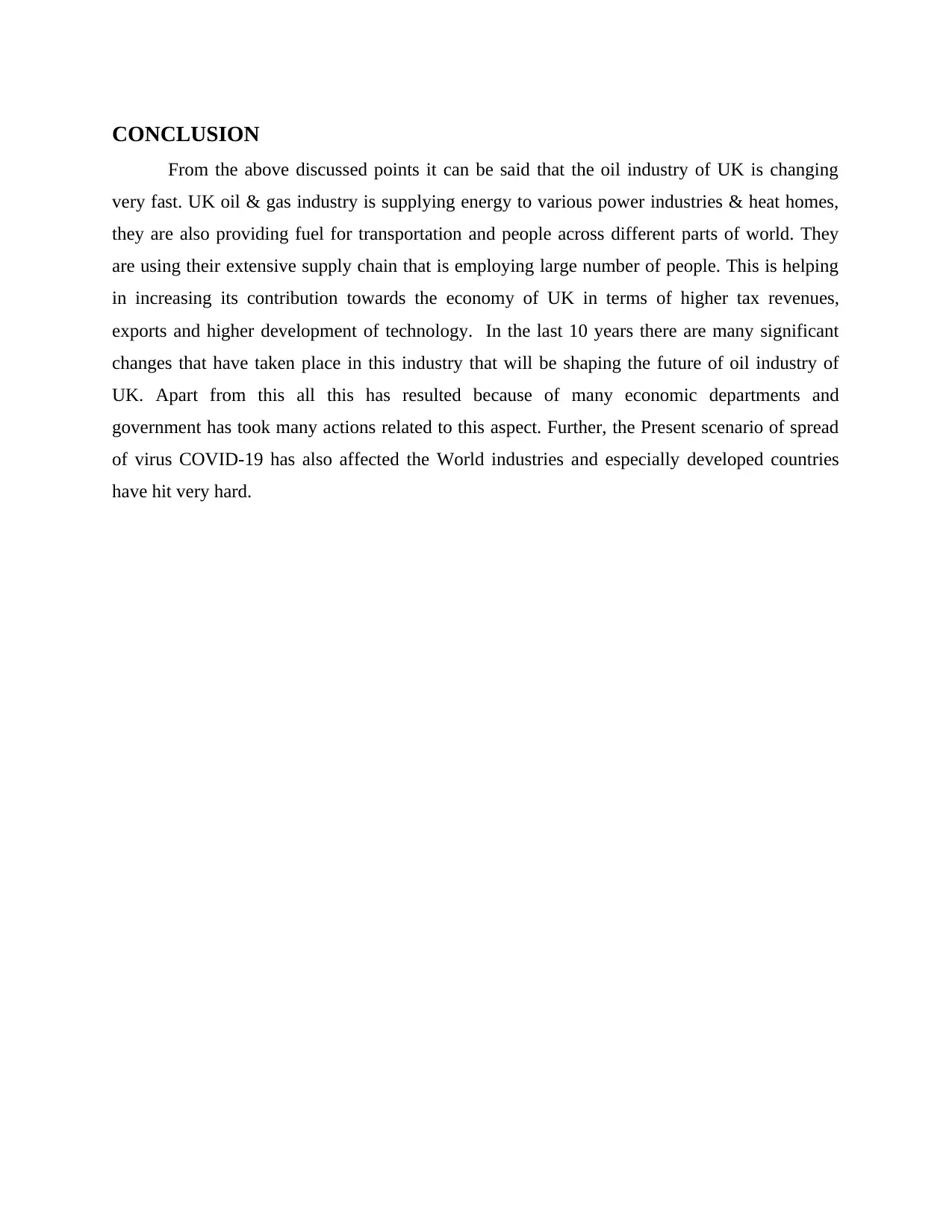
CONCLUSION
From the above discussed points it can be said that the oil industry of UK is changing
very fast. UK oil & gas industry is supplying energy to various power industries & heat homes,
they are also providing fuel for transportation and people across different parts of world. They
are using their extensive supply chain that is employing large number of people. This is helping
in increasing its contribution towards the economy of UK in terms of higher tax revenues,
exports and higher development of technology. In the last 10 years there are many significant
changes that have taken place in this industry that will be shaping the future of oil industry of
UK. Apart from this all this has resulted because of many economic departments and
government has took many actions related to this aspect. Further, the Present scenario of spread
of virus COVID-19 has also affected the World industries and especially developed countries
have hit very hard.
From the above discussed points it can be said that the oil industry of UK is changing
very fast. UK oil & gas industry is supplying energy to various power industries & heat homes,
they are also providing fuel for transportation and people across different parts of world. They
are using their extensive supply chain that is employing large number of people. This is helping
in increasing its contribution towards the economy of UK in terms of higher tax revenues,
exports and higher development of technology. In the last 10 years there are many significant
changes that have taken place in this industry that will be shaping the future of oil industry of
UK. Apart from this all this has resulted because of many economic departments and
government has took many actions related to this aspect. Further, the Present scenario of spread
of virus COVID-19 has also affected the World industries and especially developed countries
have hit very hard.
Paraphrase This Document
Need a fresh take? Get an instant paraphrase of this document with our AI Paraphraser
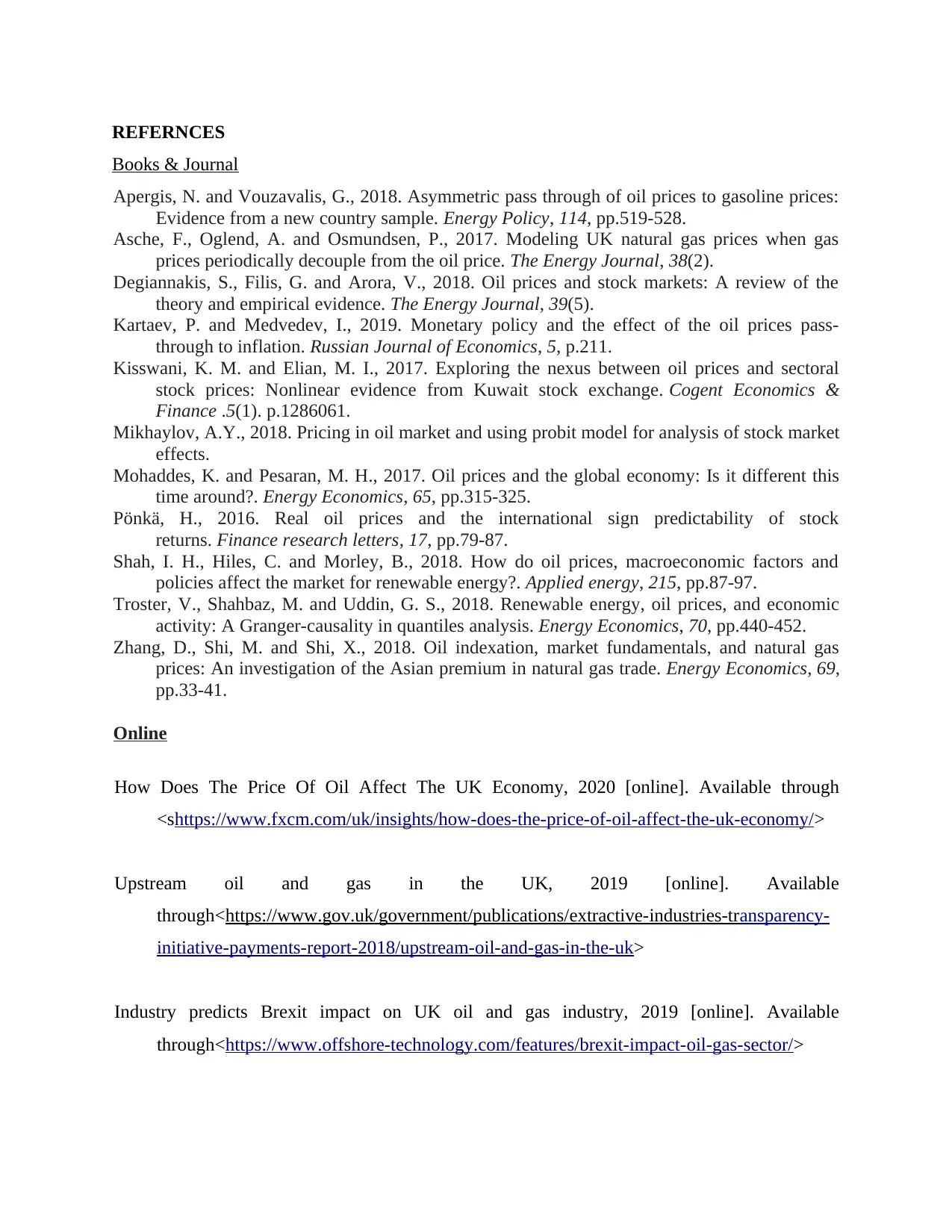
REFERNCES
Books & Journal
Apergis, N. and Vouzavalis, G., 2018. Asymmetric pass through of oil prices to gasoline prices:
Evidence from a new country sample. Energy Policy, 114, pp.519-528.
Asche, F., Oglend, A. and Osmundsen, P., 2017. Modeling UK natural gas prices when gas
prices periodically decouple from the oil price. The Energy Journal, 38(2).
Degiannakis, S., Filis, G. and Arora, V., 2018. Oil prices and stock markets: A review of the
theory and empirical evidence. The Energy Journal, 39(5).
Kartaev, P. and Medvedev, I., 2019. Monetary policy and the effect of the oil prices pass-
through to inflation. Russian Journal of Economics, 5, p.211.
Kisswani, K. M. and Elian, M. I., 2017. Exploring the nexus between oil prices and sectoral
stock prices: Nonlinear evidence from Kuwait stock exchange. Cogent Economics &
Finance .5(1). p.1286061.
Mikhaylov, A.Y., 2018. Pricing in oil market and using probit model for analysis of stock market
effects.
Mohaddes, K. and Pesaran, M. H., 2017. Oil prices and the global economy: Is it different this
time around?. Energy Economics, 65, pp.315-325.
Pönkä, H., 2016. Real oil prices and the international sign predictability of stock
returns. Finance research letters, 17, pp.79-87.
Shah, I. H., Hiles, C. and Morley, B., 2018. How do oil prices, macroeconomic factors and
policies affect the market for renewable energy?. Applied energy, 215, pp.87-97.
Troster, V., Shahbaz, M. and Uddin, G. S., 2018. Renewable energy, oil prices, and economic
activity: A Granger-causality in quantiles analysis. Energy Economics, 70, pp.440-452.
Zhang, D., Shi, M. and Shi, X., 2018. Oil indexation, market fundamentals, and natural gas
prices: An investigation of the Asian premium in natural gas trade. Energy Economics, 69,
pp.33-41.
Online
How Does The Price Of Oil Affect The UK Economy, 2020 [online]. Available through
<shttps://www.fxcm.com/uk/insights/how-does-the-price-of-oil-affect-the-uk-economy/>
Upstream oil and gas in the UK, 2019 [online]. Available
through<https://www.gov.uk/government/publications/extractive-industries-transparency-
initiative-payments-report-2018/upstream-oil-and-gas-in-the-uk>
Industry predicts Brexit impact on UK oil and gas industry, 2019 [online]. Available
through<https://www.offshore-technology.com/features/brexit-impact-oil-gas-sector/>
Books & Journal
Apergis, N. and Vouzavalis, G., 2018. Asymmetric pass through of oil prices to gasoline prices:
Evidence from a new country sample. Energy Policy, 114, pp.519-528.
Asche, F., Oglend, A. and Osmundsen, P., 2017. Modeling UK natural gas prices when gas
prices periodically decouple from the oil price. The Energy Journal, 38(2).
Degiannakis, S., Filis, G. and Arora, V., 2018. Oil prices and stock markets: A review of the
theory and empirical evidence. The Energy Journal, 39(5).
Kartaev, P. and Medvedev, I., 2019. Monetary policy and the effect of the oil prices pass-
through to inflation. Russian Journal of Economics, 5, p.211.
Kisswani, K. M. and Elian, M. I., 2017. Exploring the nexus between oil prices and sectoral
stock prices: Nonlinear evidence from Kuwait stock exchange. Cogent Economics &
Finance .5(1). p.1286061.
Mikhaylov, A.Y., 2018. Pricing in oil market and using probit model for analysis of stock market
effects.
Mohaddes, K. and Pesaran, M. H., 2017. Oil prices and the global economy: Is it different this
time around?. Energy Economics, 65, pp.315-325.
Pönkä, H., 2016. Real oil prices and the international sign predictability of stock
returns. Finance research letters, 17, pp.79-87.
Shah, I. H., Hiles, C. and Morley, B., 2018. How do oil prices, macroeconomic factors and
policies affect the market for renewable energy?. Applied energy, 215, pp.87-97.
Troster, V., Shahbaz, M. and Uddin, G. S., 2018. Renewable energy, oil prices, and economic
activity: A Granger-causality in quantiles analysis. Energy Economics, 70, pp.440-452.
Zhang, D., Shi, M. and Shi, X., 2018. Oil indexation, market fundamentals, and natural gas
prices: An investigation of the Asian premium in natural gas trade. Energy Economics, 69,
pp.33-41.
Online
How Does The Price Of Oil Affect The UK Economy, 2020 [online]. Available through
<shttps://www.fxcm.com/uk/insights/how-does-the-price-of-oil-affect-the-uk-economy/>
Upstream oil and gas in the UK, 2019 [online]. Available
through<https://www.gov.uk/government/publications/extractive-industries-transparency-
initiative-payments-report-2018/upstream-oil-and-gas-in-the-uk>
Industry predicts Brexit impact on UK oil and gas industry, 2019 [online]. Available
through<https://www.offshore-technology.com/features/brexit-impact-oil-gas-sector/>

⊘ This is a preview!⊘
Do you want full access?
Subscribe today to unlock all pages.

Trusted by 1+ million students worldwide
1 out of 12